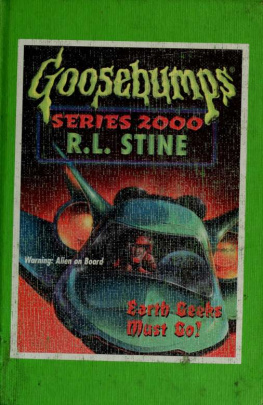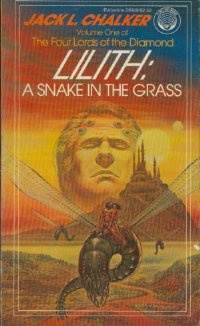Lilith: A Snake in the Grass
by Jack L. Chalker
For Lou Tabakow, a great unsung friend of science fiction for almost fifty years and a man whose kindness and friendship I will always treasure.
Prologue
Background to Trouble
The little man in the synthetic tweed jacket didnt look like a bornb. In fact, he looked much the same as most of the other clerks, junior computer operators, and political men on the make in Military Systems Command. Two beady little brownish eyes set a bit too far apart by a hawk nose, a twitchy little mouth above a lantern jawthe kind of nebhish nobody ever looked at twice. Thats why he was so dangerous.
He wore all the proper entry cards, and when handprints and retinal patterns were taken at doors that could trap or even destroy if the slightest thing was wrong he was passed without so much as an electronic pause. He carried a small briefcase, unusual only in that it was merely clasped and not chained to him or attached in some other way. Still, that caused no notice or alarmit was probably tuned to his body, anyway.
Occasionally along brightly lit halls hed meet another of his apparent ilk, and theyd pass, perhaps nodding as if they knew each other but more often simply ignoring one another as they would in a crowd or on any street corner. There was nothing exceptional about them, nothing to mark them as something apart from the common herd, because, except for their jobs and job location, there wasnt any real difference. Except for this one little man. He was definitely exceptional, being a bornb.
Finally he reached a small room in which a single computer access element was placed in front of a comfortable-looking chair. There were no warning symbols, no huge guards or robot sentinels about, even though this particular room was the gateway to the military secrets of an interstellar empire of vast proportions. There was no need. No single individual could activate that access element; doing so required the combined and nearly simultaneous consent of three different human beings and two robot backups, each of whom received a different coded order from a different source. Any attempt to use it without the actions of all the others would result not only in a dead computer and blank terminal but also in a warning flashed to security.
The little man sat down in the chair, adjusted it for proper operating position, then leaned over and casually opened his briefcase. Removing a small crystalline device, he idly flicked it on with a thumb motion and then it set against the activation plate of the terminal.
The screen flickered, came to life. Printed on it were all the access codes as if it had received them and the question of whether the user preferred voice or CRT communication. There was no question of a print-out. Not with this computer.
CRT only, please, the little man idly said, in a thin, dry, nasal voice that bore no trace of accent. The machine waited. Defensive files C-476-2377AX and J-392-7533DC, please, at speed.
The computer seemed to blink at that last; at speed would be at roughly four hundred tines a second, the limit of the CRT to form the images in the first place. Nonetheless, the computer went to work. Both plans were delivered up and snapped past the little man in less than a second.
He was pleased. So much so that he decided then and there to press his luck a little and ask for more. Run the master defense emergency plans, please, at speed, in order, he told the machine casually.
The machine obeyed. Because of the volume of material it took almost four minutes.
The little man glanced at his watch. It was so tempting to continue, but every second he was here increased his chances of somebody just looking in or some random check. That wouldnt do, not at all.
He placed his device back in his briefcase, snapped it closed, stood up, and walked out. At that point he made one minor mistake, one he would not be expected to know. You had to tell the damned thing to clear and reset the codes. If you didnt, this computer didnt react like all others and simply stay onintolerable, with access to such secretsor shut itself down. When it saw that the operator had left the room without resetting it, the machine advised control personnel of that fact, then locked in emergency shutdown until reset.
As the little man reached the first checkpoint door on his way out, things were already starting to crack around him.
The young woman glared for a moment at the red alert light that had flashed on her console. She ran a quick check to make sure there was no internal malfunction, then punched up the troublethe Eyes Only Storage Computer.
Although she was one of those with part of the code that would activate the computer, she could not ask it any questions on its information storage from where she wasbut she could get security information. She knew she had given no access so far today, so she punched two buttons and instructed, Run tape last operation.
The little mans face showed clearly. Not only his face, but his retinal pattern, thermal pattern, everything about him that could be read by remote sensors and recorded. She brought in the rest of the computer net. Identify! she commanded.
Threht, Augur Pen-Gyl, OG-6, Logistics, came the computers reply.
Before her hand could hit the alarm it had already been hit by two of her associates.
No alarms sounded, no flashing lights and whistling bells that would panic or tip off a spy. Instead, as Threht reached the third and last security door, peered into the oculator, and pressed his palm on the identiplate, it simply refused to open.
He realized at once that security, both human and robotic, was already closing in on him from all sides, and decided in a flash that the least security would be on the other side of the door. He raised his left hand, paused for a moment, frozen, as if marshaling all he had, then struck the door near its locking mechanism. The area buckled, and he leaned forward and without seeming effort pushed until the door slid back enough for him to squeeze through.
Once he was inside, the door slammed shut behind him, and he could hear the secondary seals slide into place. It formed an effective trap, between the inner and outer door. The chamber itself was airtight; so if someone got this far, the air inside the chamber could be rapidly withdrawn. No chances, not with somebody this good.
The vacuum hardly bothered him. He kicked at the outer door once, twice; on the third try, it gave. He leaned forward with all his might, opening a crack and holding the door open against the massive inrush of air until the pressure equalized. At that point he threw it open and strode through into the main entrance hall.
His guess had been correct; security forces were only now reaching the hall area, and stunned personnel throughout the hall prevented a quick shot. Four sleek black security robots sped toward him. Apparently unafraid, he let them advance. Then, just before they reached him, he suddenly ran right at the two in the lead, pushing one into the other and spilling both to the floor. The scene was incredible: a tiny, ordinary-looking fellow tumbled four tons of animated metal without so much as recoiling.
He moved quickly now, directly for the clear windows at the front of the hall. He moved with such tremendous speed, speed beyond human and most robots, that when he reached the windows he leaped straight into them. The panes were tremendously thick, able to resist even conventional bornbs hurled against them, but they cracked and shattered like ordinary glass as he sailed through; he then dropped the twelve meters to the ground, landing on his feet with perfect balance, and started to run across the broad courtyard.
By then he had lost the element of surprise. Realizing from the point at which hed battered in the first door that they were dealing with some clever sort of robot, the security forces had assumed the worst and were ready for him with killer robots, human troops, even a small laser cannon.








